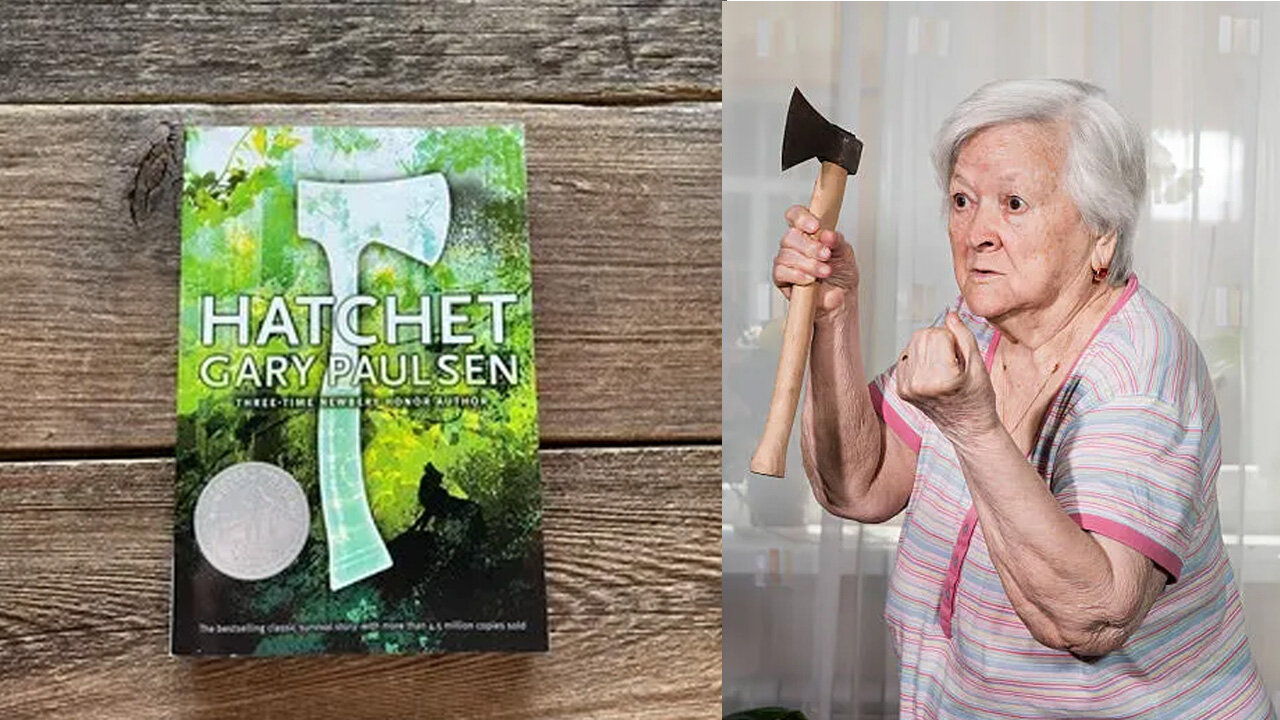Premium Only Content

'Hatchet' (1986) by Gary Paulsen
Gary Paulsen’s 'Hatchet' (1986) is a classic young adult survival novel that has earned enduring popularity for its taut pacing, vivid detail, and exploration of resilience in the face of isolation. The novel tells the story of thirteen-year-old Brian Robeson, who finds himself stranded alone in the Canadian wilderness after the small bush plane he is travelling in crashes, killing the pilot. Armed with only a hatchet—a gift from his mother—Brian must confront hunger, wild animals, injury, and his own fear as he learns to survive.
One of the book’s most striking qualities is its unflinching realism. Paulsen avoids the romanticised, adventure-story depiction of wilderness survival. Instead, he offers an almost instructional narrative of how one might actually find food, build shelter, and make fire with minimal tools. Brian’s struggles—his first failed attempts to catch fish, the gut-wrenching encounter with a porcupine, and the gradual honing of his skills—feel grounded in genuine research and personal experience. This authenticity makes the reader not only respect Brian’s determination but also feel the precariousness of his situation.
Thematically, 'Hatchet' explores the idea of self-reliance and transformation through hardship. At the novel’s start, Brian is an ordinary boy, distracted by his parents’ divorce and unused to physical or emotional challenges of such magnitude. Over time, he undergoes a profound change, gaining patience, resourcefulness, and an instinct for problem-solving. The hatchet itself becomes a symbol of this transformation—initially just a tool, it comes to represent his connection to life and his own ability to adapt.
Paulsen’s prose is deceptively simple, matching the audience’s age range but carrying a restrained lyricism when describing the natural world. The landscape is painted with sensory precision: the sting of mosquitoes, the sharp smell of smoke, the shimmer of sunlight on water. Nature is both beautiful and indifferent, offering moments of awe but never losing its capacity to harm.
Perhaps the most powerful aspect of 'Hatchet' is its psychological depth. Survival here is not just about food and shelter but also about maintaining mental stability in prolonged solitude. Brian’s internal monologue—his moments of despair, his stubborn hope—offers a compelling portrait of a young mind forced to mature in accelerated fashion.
While the novel is tightly focused on one character’s ordeal, it touches lightly on broader ideas about humanity’s relationship with nature. In a world before constant digital connection, 'Hatchet' serves as a reminder of how utterly dependent most people are on modern conveniences, and how quickly that dependency is revealed when those supports vanish.
In conclusion, 'Hatchet' is more than a survival story; it is a coming-of-age tale in extreme circumstances, blending the suspense of adventure with the emotional journey of self-discovery. Gary Paulsen’s lean prose, meticulous detail, and respect for both his character and his young readers ensure its place as a modern classic. It remains as gripping and relevant today as it was upon its release—an inspiring testament to the human will to endure.
-
 21:05
21:05
Adam Does Movies
21 hours ago $0.62 earnedAlien: Earth Episode 8 - Recap
9.88K3 -
 18:49
18:49
World2Briggs
18 hours ago $0.31 earnedTop 10 States To retire in 2026 According to Experts
12.5K4 -
 19:03
19:03
Blackstone Griddles
14 hours agoParmesan Ranch Chicken Sandwich oxn the Blackstone Griddle
11.9K3 -
 LIVE
LIVE
BEK TV
23 hours agoTrent Loos in the Morning - 9/26/2025
158 watching -
 LIVE
LIVE
The Bubba Army
22 hours agoJimmy Kimmel's Audience Plummets by 20 MILLION! - Bubba the Love Sponge® Show | 9/26/25
1,380 watching -
 17:24
17:24
Sponsored By Jesus Podcast
21 hours agoLoving Our ENEMIES & Praying for Those Who Hurt Us
13.7K4 -
 4:22
4:22
NAG Daily
14 hours agoSaving Grace #4 — Is The BIBLE Wrong?
10.7K5 -
 6:14
6:14
Sugar Spun Run
1 day ago $1.31 earnedApple Cobbler
15.9K4 -
 31:26
31:26
Clownfish TV
6 days agoJimmy Kimmel GONE FOR GOOD?! Insider Claims Disney is DONE! | Clownfish TV
20.2K27 -
 7:53
7:53
Rethinking the Dollar
13 hours agoForget AI & War: This Is What Will Break You in 2026
9.33K5